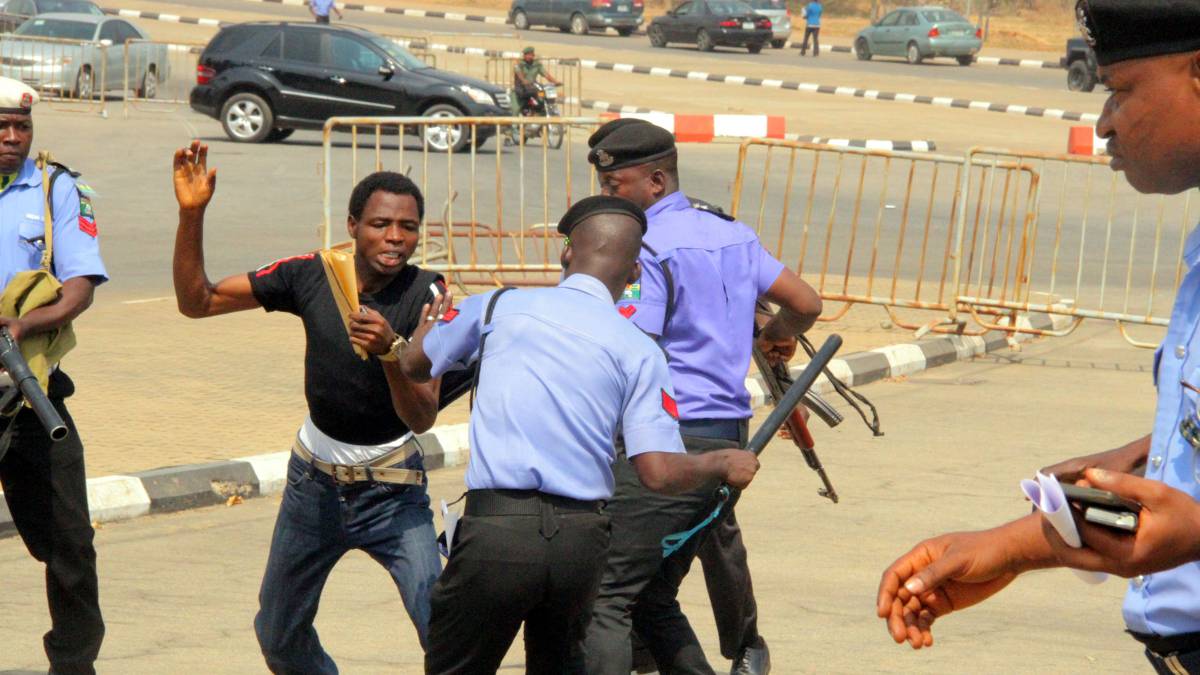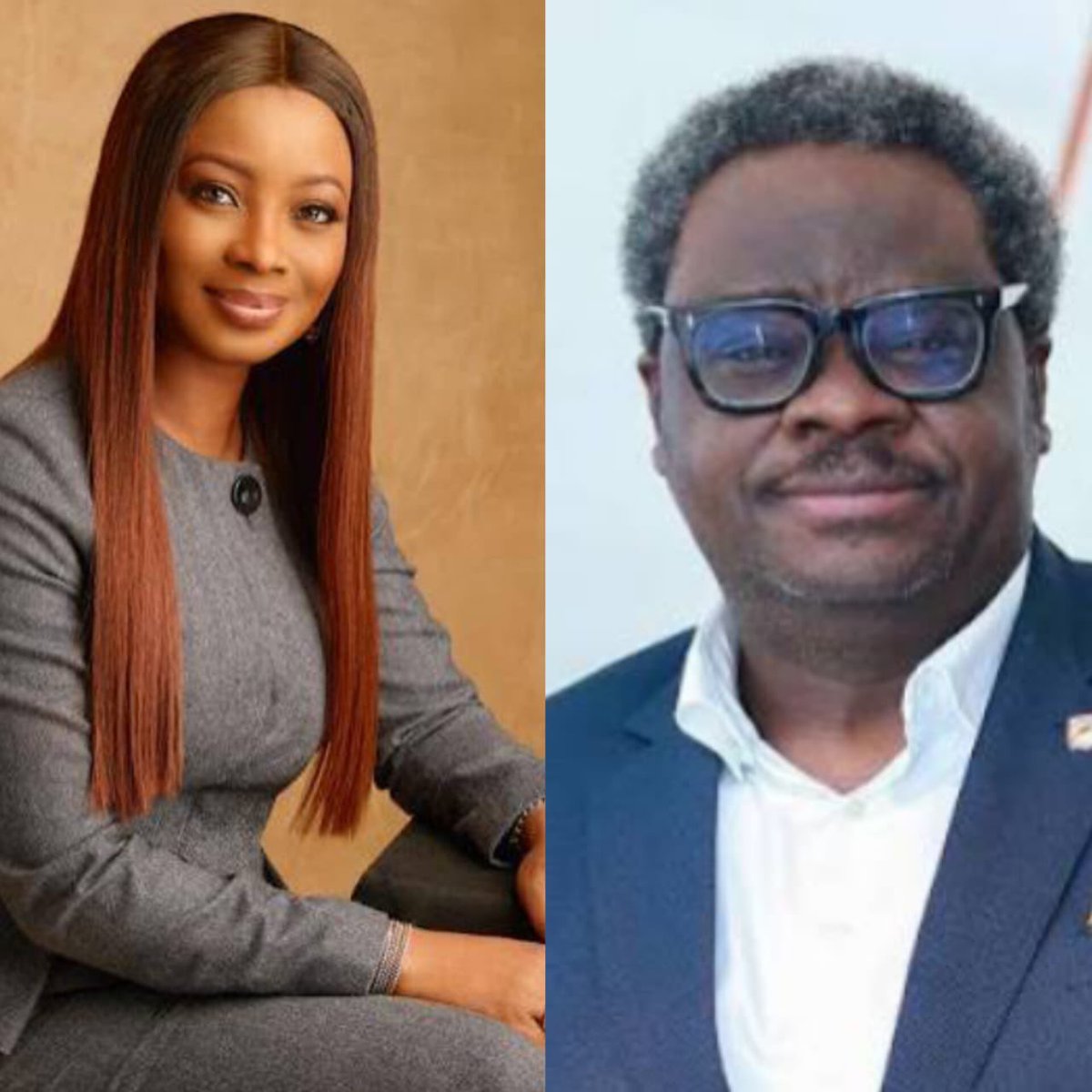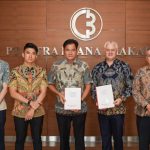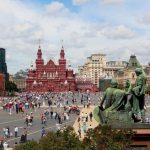General
Human Rights Watch Condemns Deadly Crackdown on Shia Protesters

By Modupe Gbadeyanka
Authorities in Nigeria have been criticised by the Human Rights Watch for the “excessive use of force” on members of the Shia Islamic Movement in Nigeria (IMN) during their peaceful protest in Abuja, on July 22, 2019.
At the demonstration, which later turned deadly, Nigerian police fired shots at the religious group who are demanding the release of their leader, Sheikh Ibrahim El Zakzaky, who has been kept in detention since 2015 by the government despite court granting him bail to seek medical attention.
At Monday’s protest, a senior policeman and a journalist with Channels Television were among the 11 persons killed during a fracas between members of the Shia Movement and the cops.
Reacting to the incident in a statement on Tuesday, the Human Rights Watch called on the authorities to allow the detained religious leader proper medical care.
“The Nigerian police’s apparent rush to use firearms against Shia movement protesters is unlawful and counterproductive,” said Anietie Ewang, Nigeria researcher at Human Rights Watch. “The authorities should bring an end to their violent crackdown on the Shia Islamic Movement in Nigeria, and investigate the excessive use of force by the police.”
The July 22 protest began at about 12:30 p.m., when several thousand protesters marched toward the Federal Government Secretariat to register their grievances. As they approached the Federal Ministry of Foreign Affairs, the Nigerian Police Force opened fire and threw teargas at the protesters, said Mohammed Ibrahim Gamawa, a member of the Resource Forum, an IMN-associated group.
Gamawa said he saw the police shoot two women and two men and that the women were shot in the head. A local journalist said he saw 11 bodies of protesters who had been shot. The Shia movement also said that about 11 had died.
At least 30 members of the group were injured, Gamawa said. He said that in many cases, hospital staff wouldn’t treat gunshot wounds unless the victims first presented a police report, to ensure the police are notified of gun incidents.
“They started shooting toward us, at everyone – they didn’t care who the bullets hit,” said a 26-year-old University of Abuja student. “A bullet hit my left leg, and I was carried away by my brothers in the movement.” He said that he participated in the march with his friends until policemen opened fire on the group. He said he went to the university hospital’s emergency room but left when police arrived to arrest protesters. “We have changed our location twice because we’re afraid of the police. The bullet is still in my leg; I think my leg is broken. I feel so much pain all over my body.”
A 20-year-old protester said that he was shot in the ankle. He was afraid he would be arrested if he went to the hospital, so he was being treated in hiding by friends with medical training.
The Nigerian broadcaster Channels Television Station reported that a stray bullet killed one of their journalists covering the protest, Precious Owolabi.
The police issued a statement on July 22, confirming the death of Deputy Commissioner of Police Usman A.K Umar, who the police claim was shot by the protesters. The statement said that two other senior police officials were also injured by protesters who “violently attacked innocent citizens and Police personnel on duty” and “also razed down a National Emergency Management Agency (NEMA) Response Post close to the Federal Secretariat, Abuja and two (2) vehicles.”
The Shia movement denied all allegations of violence by their members who took part in the protest. They alleged that the police were responsible for the deaths of Deputy Commissioner Umar and the reporter.
The police announced that they had arrested 54 IMN members since the protest. They are currently “under interrogation” but have not been charged.
Nigerian security forces should abide by the United Nations Basic Principles on the Use of Force and Firearms by Law Enforcement Officials, Human Rights Watch said. The Basic Principles state that security forces shall “apply non-violent means before resorting to the use of force and firearms,” and that whenever the lawful use of force and firearms is unavoidable, security forces should exercise restraint and act in proportion to the seriousness of the offense and the legitimate objective to be achieved. They should also minimize injury and preserve human life. The intentional lethal use of firearms may only be made “when strictly unavoidable in order to protect life.” The Basic Principles further provide that in cases of death or serious injury, “a detailed report shall be sent promptly to the competent authorities.”
Nigerian judicial officials and the National Human Rights Commission should carry out credible, impartial investigations into the violence during the July 22 protest, Human Rights Watch said. Those responsible for the unlawful use of force should be brought to justice in fair trials. Authorities should immediately release protesters who were arbitrarily arrested and who have not been charged with a credible offense, and they should ensure that all injured protesters have safe access to urgent medical care.
Nigerian authorities have used excessive force against Islamic Movement in Nigeria protests since 2015, Human Rights Watch said. On December 12, 2015, the Nigerian army used excessive force against the group’s street procession in Zaria, Kaduna State, in northwest Nigeria, allegedly to clear the way for the army chief’s convoy. In an ensuing three-day crackdown, the army killed 347 members of the group and arrested hundreds more, including the group’s leader, El Zakzaky, and his wife, Ibraheemat.
In September 2016, a Kaduna State Judicial Commission of Inquiry recommended prosecuting soldiersinvolved in the Zaria killings. State prosecutors ignored that recommendation. However, they brought charges against 177 members of the Shia movement for the killing of Cpl. Dan Kaduna Yakubu, the only military casualty in the incident.
IMN representatives allege that subsequent crackdowns on the group’s activities and protests in Kaduna, Kano, Katsina, Yobe, Plateau, Sokoto, and Abuja calling for justice and the release of their leader have resulted in the deaths of at least 110 people.
In one of the most violent incidents, in October 2018 soldiers opened fire on large groups of Shia protesters in Abuja, killing at least 42 IMN members during three days of protests, according to the group.
Human Rights Watch confirmed that at least 21 people were fatally shot during the violence in Karu, Abuja on October 29.
“Nigerian authorities should put an end to using excessive and lethal force against processions and protesters,” Ewang said. “Those responsible for the latest deadly crackdown on Shia movement members, as well as the earlier bloody incidents, should be fairly brought to justice.”
General
Transcorp Power Trims Debts by 18% to Strengthen Financial Position

By Aduragbemi Omiyale
To strengthen its financial position and demonstrate disciplined financial management and commitment, Transcorp Power Plc paid down over N7 billion in borrowings in 2025, according to its audited financial results for last year.
Business Post reports that this action reduced its total borrowings by 18.57 per cent to N30.7 billion from N37.7 billion as of December 2024.
This happened as the subsidiary of Transcorp Plc grew its revenue for the year by 30 per cent to N398.27 billion from N305.94 billion achieved in FY 2024, with the gross profit up by 14 per cent on a year-on-year basis to N162.44 billion from N142.21 billion, and the Profit After Tax (PAT) rising by 14 per cent to N91.42 billion from N80.01 billion in 2024, as the Earnings per Share (EPS) went up to N12.19 from N10.67 in 2024.
In the year, total assets jumped by 42 per cent to N563.48 billion from N396.78 billion in FY 2024, and total equity rose by 44 per cent to N183.40 billion from N126.63 billion.
It was observed that the impressive performance of the company was driven by an enhanced generation capacity, with saw the return of GT20, adding 100MW to the national grid from January 3, 2025, which significantly improved overall generation output.
“We remain dedicated to improving lives and transforming Africa, ensuring operational excellence and making strategic investments that deliver sustainable, long-term value to our shareholders, while also powering Nigeria’s socioeconomic development,” the chairman of Transcorp Power, Mr Emmanuel Nnorom, stated.
“The confidence in our financial position allows us to propose a full year dividend of N5.50 per share for 2025, comprising an interim dividend of N1.50 paid on August 18, 2025, and a final of N4.00k, representing a 10 per cent increase from the previous year’s dividend,” he added.
Also commenting, the chief executive of the power generation firm, Mr Peter Ikenga, said, “Our FY 2025 results reflect our steadfast commitment to operational excellence, sustainable growth, strategic market expansion and enhanced generation capacity, which continue to fuel significant revenue growth, enabling us to consistently generate power to the national grid. During the year, we increased our average available capacity from 417MW to 550MW and improved average generation output despite grid and transmission line-related issues.”
“Notwithstanding the network transmission line issues, our FY 2025 performance remained strong and reflects our steadfast commitment to operational excellence and sustainable growth.
“Our confidence in the future trajectory of Transcorp Power to deliver exceptional value to our shareholders remains unwavering. We will continue to work with relevant stakeholders, particularly Transmission Company of Nigeria (TCN), to strengthen the transmission lines and improve evacuation from our plant in 2026 and beyond,” he added.
General
NIMASA Mulls Expansion of Nigeria’s Deep Blue Project

By Adedapo Adesanya
The Nigerian Maritime Administration and Safety Agency (NIMASA) is considering expanding the country’s Deep Blue Project due to its perceived success, with impact felt across the Gulf of Guinea, where it has helped to reduce piracy massively and gained global recognition, to ensure sustainability and greater impact.
The Director General of NIMASA, Mr Dayo Mobereola, made this known during his strategic visit to the Chief of Naval Staff, Vice Admiral Idi Abass, at the Naval Headquarters, Abuja.
Mr Mobereola, while commending the Navy for the harmonious collaboration with NIMASA and congratulating the CNS who had previously served as Maritime Guard Commander under the agency, called for continued partnership with the security outfit under his watch.
“It is important that we continue our partnership and strengthen our relationship. Our purpose here is to congratulate you and to discuss the benefits of the Deep Blue Project, how to sustain it, expand it, and increase its impact on the Gulf of Guinea.
“We are confident that we have the backing of the President, the Minister of Marine and Blue Economy, and the Nigerian Navy, hence, we are working towards presenting our proposal on the necessary improvements to be undertaken,” he stated.
The DG acknowledged the importance of the Deep Blue Project, noting that its impact resonates globally, with the International Maritime Organisation (IMO) commending it.
“The Deep Blue Project is vital, and countries around Africa and some other parts of the world are coming to copy our model. The IMO is asking how a civilian organisation was able to achieve this feat. It is therefore important that we continue to collaborate and do even better for greater sustainability,” he said.
Mr Mobereola also congratulated the Chief of Operations, Nigerian Navy, Rear Admiral Musa Katagum, who is joining the NIMASA governing board as the Navy’s representative.
On his part, the Chief of Naval Staff, Vice Admiral Idi Abass, while welcoming the NIMASA DG and his delegation, commended the Agency for the good work it is doing in the maritime sector and its continued support to the Nigerian Navy.
“Part of my command’s objective is to work in synergy with other agencies to achieve our goal as a country. We complement each other. We have no option but to collaborate and synergise.”
The Naval chief noted some concerns, which include the MoU between NIMASA and the Nigerian Navy, which has been in place since 2007 and should be revisited.
He also solicited for the Navy to be called upon for such needs as vessel repair, hydrographic surveys and chartings, stating the Navy’s capacity in handling such tasks.
The CNS also canvassed NIMASA’s assistance for wreck removal, particularly as the Navy gears towards its 70th Anniversary, where it looks forward to welcoming foreign ships.
He further commended NIMASA for its recent launch of the Cabotage Vessel Financing Fund (CVFF) Application Portal, noting that the organisation has come a long way in its planned disbursement of the fund.
General
Ikeja Electric Fumes Over Impropriety Allegations Against CEO, Chairman

By Adedapo Adesanya
Ikeja Electricity Distribution Company has described as malicious and misleading a widespread publication currently circulating online alleging impropriety about its chief executive, Ms Folake Soetan, and its board chairman, Mr Kola Adesina.
The management of the DisCo noted that a publication attributed to ‘Nigerian Global Business Forum’ defamed its CEO and the chairman of the IKEDC board.
The company said, “The publication, attributed to yet to be verified individuals and organisation, is clearly intended to misinform the public and bring the company and its leadership into disrepute through fabricated claims, the DisCo observed.”
Ikeja Electric noted that its investigation so far revealed that the ‘Nigerian Global Business Forum’ is an unregistered organisation with no recognised legal or corporate existence locally or abroad.
According to the energy firm, the signatories, “Dr Alaba Kalejaiye” and “Musa Ahmed,” have no verifiable professional credentials or established public profiles, and the publication contains false and misleading statements regarding Ikeja Electric’s operations, safety record, and financial practices.
The organisation said it had instructed its legal advisers to conduct a thorough forensic investigation and to initiate defamation proceedings against the authors, publishers, and any persons or entities found responsible for sponsoring or disseminating this malicious publication.
Ikeja Electric said it operates within a strict framework of accountability and remains committed to transparency and service improvement, warning it will not tolerate coordinated disinformation campaigns aimed at undermining public confidence and tarnishing its corporate integrity.
“Ikeja Electric remains steadfast in its mandate to deliver reliable power while upholding the highest standards of corporate governance and customer excellence.
Members of the public are advised to disregard the false publication in its entirety,” it said in a statement.
-

 Feature/OPED6 years ago
Feature/OPED6 years agoDavos was Different this year
-
Travel/Tourism9 years ago
Lagos Seals Western Lodge Hotel In Ikorodu
-

 Showbiz3 years ago
Showbiz3 years agoEstranged Lover Releases Videos of Empress Njamah Bathing
-

 Banking8 years ago
Banking8 years agoSort Codes of GTBank Branches in Nigeria
-

 Economy3 years ago
Economy3 years agoSubsidy Removal: CNG at N130 Per Litre Cheaper Than Petrol—IPMAN
-

 Banking3 years ago
Banking3 years agoSort Codes of UBA Branches in Nigeria
-

 Banking3 years ago
Banking3 years agoFirst Bank Announces Planned Downtime
-

 Sports3 years ago
Sports3 years agoHighest Paid Nigerian Footballer – How Much Do Nigerian Footballers Earn








